A PROSECUTOR'S EXPERIENCE WITH SEXUAL ASSAULT CRIMES
Prosecutors handle criminal charges related to sexual offenses that may be misdemeanor or felony charges. Some of these charges may involve sexual conduct toward another person, online offenses targeting children, or offenses that involve child sexual exploitation material (sometimes referred to as “CSAM” or “child porn”). To convict anyone of a criminal offense, the prosecution must prove the crime beyond a reasonable doubt. A defendant is presumed innocent until that burden of proof has been established.
Prosecutors find these cases to be complex, involve very sensitive matters, and are often considered high-stakes cases because of the consequences that may follow. Great care is taken with victims to ensure they have access to community resources. The prosecutors handling felony sex offenses are very experienced, averaging 12-15 years of experience with complex cases.
SEX OFFENSES CHARGED 2023
- 52 felony sex offense cases were filed. (15 sexual assault on child, 16 child sexual exploitation, 2 Incest, 2 enticement of a child, 3 internet luring, 5 prostitution of a child, 2 felony indecent exposure because of prior offenses, 1 felony unlawful sexual contact, and 6 sexual assaults).
- 24 misdemeanor cases were filed in 2023. (9 unlawful sexual contact, 15 indecent exposure).
- This information does not include the total number of charges in any single case or the number of victims that are part of any single case.
WHAT ARE SEX OFFENSES?
- The definition of sexual offense is defined differently for specific statutes. In general, sexual offenses mostly involve: sexual contact for the purpose of sexual gratification or abuse, sexual penetration or sexual intrusion without consent or when a victim is incapable of consenting based on age or the victim’s condition, internet contact with a child for the purpose of sexual conduct, or indecent exposure with an act exposing genital causing affront/alarm or to satisfy sexual desire, indecent exposure with an act of masturbation to cause alarm.
- Some sexual acts (sexual contact, penetration, intrusion) are prohibited by law based on the difference in age between a victim and an offender whether or not it is a consensual act. This means that consent is not a defense when there is a defined difference between the age of the victim and the offender. Some states refer to this as statutory rape. An example of this is in Colorado is Sexual Assault on Child, Sexual Assault on Child Position of Trust, Incest.
DEMOGRAPHICS
AGE OF OFFENDERS
Of the 52 filings for felony sexual offenses, twenty-eight involved adults who were 36 years of age or older, twelve were 26 to 35 years old, six were ages 18-25 years old, and six of these cases involved juvenile offenders.
CHARACTERISTICS OF DEFENDANTS AND VICTIMS
In 2022, all offenders charged for felony sex offenses were male. 82% of the victims were female, 16% were male, and 2% were unknown (which could include not reported).
SENTENCING/OUTCOMES
Those charged with felonies face the potential for felony convictions and may include sentencing options such as probation, community corrections or prison. Because of the seriousness of these charges, the outcome of a felony charge rarely results in a reduction to a misdemeanor offense, but may involve a reduction to a plea for a lesser felony conviction. The prosecutors who handle these cases recognize the paramount interest of public safety and protection of children.
SEX OFFENDER REGISTRATION
Convictions for unlawful sex offenses require individuals to register as a sex offender. Sex offender registration is not imposed as a punishment, but as a measure of community safety and monitoring where offenders reside. Crimes listed under C.R.S. 16-22-102(9) are required to register as a sex offender.
An offender who has been designated by a judge to be a “sexually violent predator” requires community notification requirements and more intense reporting requirements.
If any offender pleads guilty and receives a deferred judgment (meaning the conviction is not yet entered, but the defendant is required to submit to supervision and treatment), that person will also have to register as a sex offender during any supervision.
The Colorado Sex Offender Registry can be found here: https://apps.colorado.gov/apps/dps/sor/
FREQUENTLY ASKED QUESTIONS:
WHAT IS AN INDETERMINATE SENTENCE?
A conviction for some felony sexual offenses, such as Sexual Assault on a Child, requires lifetime supervision, which legally is referred to as “indeterminate” sentencing. This means a person convicted of this specific type of offense is subject to supervision by probation or parole for the rest of their lives. C.R.S. 18-1.3-103(5)(a) provides a list of offenses that require indeterminate sentencing. An offender does have the ability to discharge from that obligation depending on their success in treatment, rehabilitation, stability in the community, and reduction of risk of another sex offense (at 10 years for a Class 4 felony, at 20 years for a Class 2 or 3 felony).
IS PRISON REQUIRED FOR FELONY SEX OFFENSE CONVICTIONS?
Some felony sex charges may contain aggravating factors that may justify an offender being sentenced directly to prison without a probation option. Examples of this include “pattern of abuse” (more than one act of sexual assault on a child), sexual penetration or intrusion, causing bodily injury to a child or the use of force, threats or intimidation. These types of cases require prison based on the aggravating circumstances and the victim and society.
HOW LONG DOES IT TAKE TO PROSECUTE SEX OFFENSES?
Because felony sexual offenses carry such significant penalties and consequences, these cases take longer than other types of crimes to reach an outcome in the court system. These cases are likely to have many more court hearings than non-felony sex offense cases because the cases have more complex issues.
Felony Sex Offenses
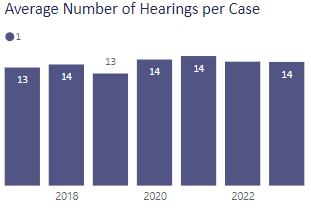
Non-Felony Sex Offenses
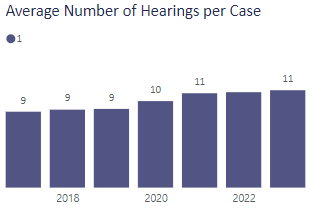
If a felony sex offense proceeds to trial, the number of hearings and timeliness to reach a disposition is significantly higher. In preparation for a trial, the legal issues and determination of what evidence may be admissible in trial can become very complex and highly litigated taking more court time. The prosecutors in the District Attorney’s Office are conscientious of making a good record to protect victims, protecting the rights of an offender including the right to effective assistance of counsel, and protecting the integrity of a conviction in the event that the offender is convicted at trial. An appeal is likely to follow any conviction after trial. Appeals can generally take two to four years to reach a conclusion on the appellate level.
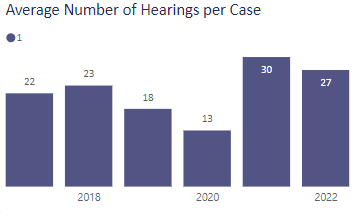
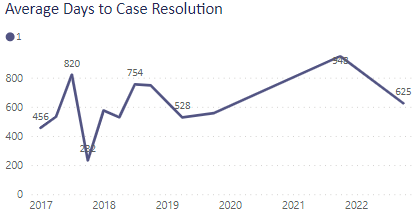
GUILTY PLEAS
A plea agreement means the prosecution and defense have come to an agreement on what type of charge an offender will plead guilty to in order to resolve the case. There are many factors that weigh into a plea agreement, including but not limited to:
- the length of the abuse,
- the type of abuse,
- the age of the victim,
- the age of the defendant,
- the defendant's position of trust,
- any input from the victim and parents (if the child is under the age of 18),
- any injury to the victim,
- the strength of the evidence,
- any prior criminal history of the defendant, and
- any prior sexual offense history of the defendant and previous sentences imposed.
If an offender chooses to plead guilty, that is likely to happen much earlier than a trial. A plea of guilty means the offender pleads guilty to what has been agreed upon in a plea agreement. The plea agreement is an agreement reached between the prosecutor and the defense.
With a plea of guilty, the victim will not need to testify, other witnesses will not need to testify, and an appeal is not likely to follow. A victim will have the opportunity to explain to the court how this crime has impacted them, without being cross-examined.
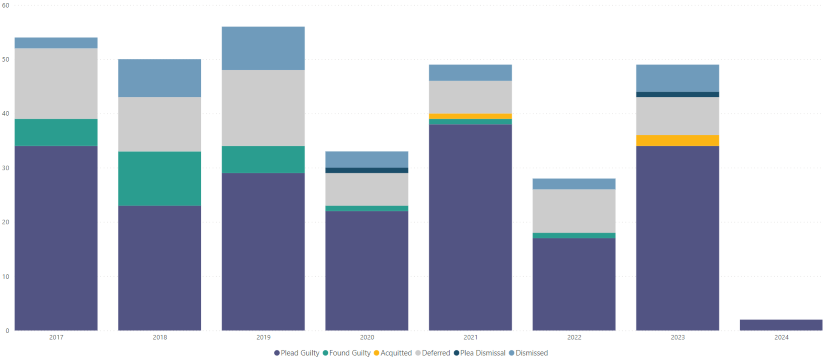
SENTENCING
Felony sexual offenses carry mandatory consequences that may include sex offender registration, offense-specific evaluation and treatment by certified providers approved by the Sex Offender Management Board, and some offenses may carry prison. Felony sexual offenses are taken very seriously by the District Attorney’s Office, which is evident in the types of sentences imposed here in Mesa County.
A significant number of felony sex offenders are sentenced to the Department of Corrections.
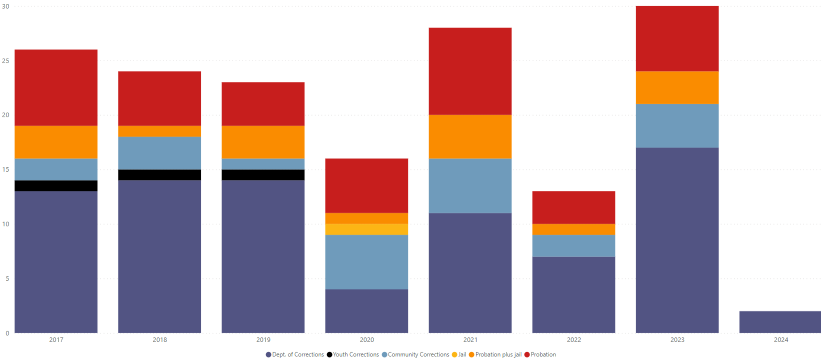
MISDEMEANOR SEX OFFENSES
Misdemeanor sex offenses do not carry prison time, although those crimes may carry possible jail time in the Mesa County Detention facility. Because these offenders are likely to remain in the community, probation is a critical resource often integrated into plea agreements to ensure the offender is supervised.
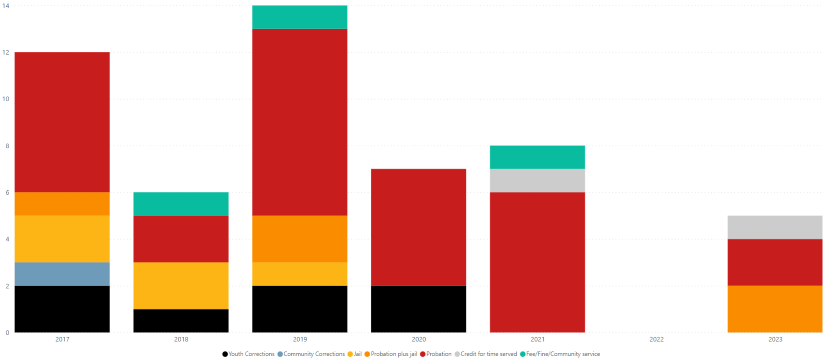
WHAT IS THE VICTIM RIGHTS AMENDMENT (VRA)?
The District Attorney’s Office is mandated by law to follow the Victim Rights Amendment to ensure that victims are honored and protected within the court system in a manner no less vigorous than the protection afforded to criminal defendants. C.R.S. 24-4.1-301. While prosecutors are not attorneys for the victim, the Victim Rights Amendment directs prosecutors to engage in “meaningful consultation” about a plea agreement before an agreement is reached, so long as the victim provides the DA’s Office with his/her phone number and contact information. Victims have the right to be present at any critical stage of the proceedings, which also allows for a victim or a minor victim's parents to be present even during trial.
Victims may perceive that the rights of defendants often seem to compete against the rights of victims. Prosecutors work diligently to make sure victims are seen and heard. Dan Rubinstein, the elected District Attorney in Mesa County, has worked persistently to expand the Victim Witness unit with additional staff to ensure that his office prioritizes victims and services to victims. The graph below shows the expansion of staff in the Victim Witness unit since 2016.

The District Attorney’s Office also employs a very special dog named Rachael. Rachael is used as often as possible and attends interviews with child victims, meetings with victims, therapy sessions, and court appearances with victims which often include courtroom testimony. Prosecutors and our Victim Specialists will also introduce victims, especially child victims, to the courtroom to help make them comfortable before trials. Rachael is often used during this experience.

The graph below demonstrates the major strides that have been taken to consult with a victim as soon as possible.
AVERAGE NUMBER OF DAYS TO VICTIM CONTACT
